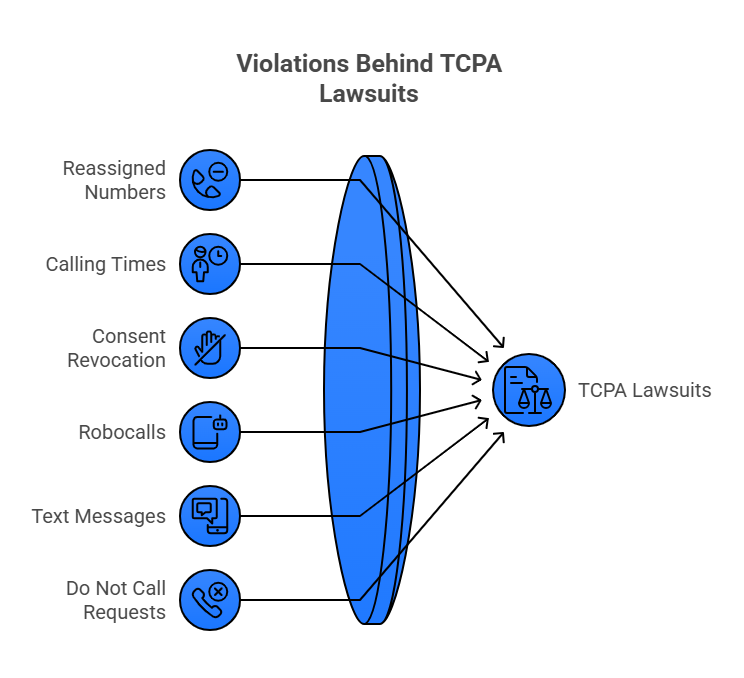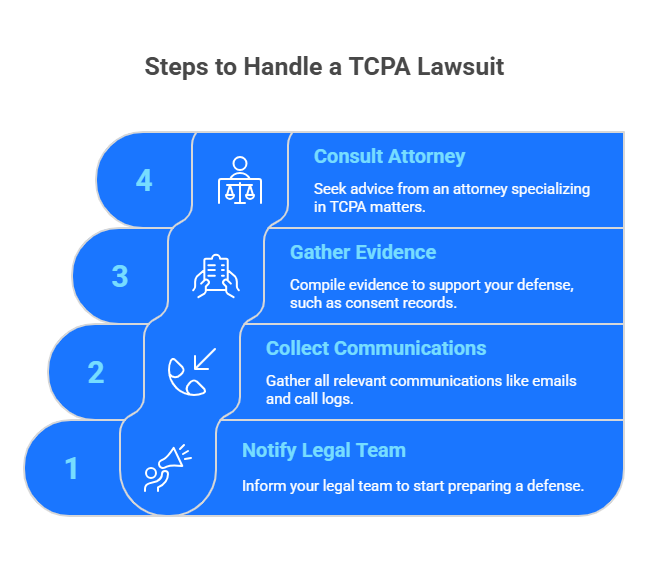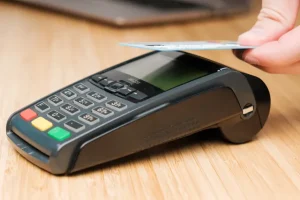TCPA Lawsuits on the Rise in 2025
2025 has been a busy year for TCPA lawsuits. From January 1st to April 30th, 880 TCPA lawsuits were filed, a 44% increase from the same period in 2024. 78% of those suits are class actions. We are in an era when professional plaintiffs and the law firms that represent them are clearly being aggressive.
In this article, we’ll explore the TCPA violations plaintiffs are alleging and how telemarketing organizations can button up their operations to minimize vulnerability.

Reassigned Numbers
Reassigned numbers are emerging as a significant risk for telemarketers, with the number of related lawsuits rising fast. The reassigned number risk scenario often plays out like this:
- A consumer gives consent to receive calls or texts.
- The consumer later disconnects the number.
- The number is reassigned to a new owner who hasn’t given consent to be contacted.
- Businesses continue to call the number believing they have express consent…leading to TCPA liability.
Professional plaintiffs use the tactic of giving consent and changing phone numbers as a tool in their kit.
In 2021, the FCC launched the Reassigned Numbers Database (RND), which allows businesses to check if a phone number has been permanently disconnected and reassigned to someone else before initiating a call or text. If the RND delivers a “no” response (meaning the number has not been reassigned), businesses may qualify for a safe harbor from TCPA liability, even if the call turns out to be a mistake. To benefit from this protection, companies must do the following:
- Subscribe to the RND
- Query the database before making calls/texts
- Keep records of their queries and results
To minimize their liability, businesses should consistently check the RND to see if the numbers on their call lists have been reassigned.
Calling Times
Plaintiffs are pouncing on calling times violations. The TCPA clearly states that no person or entity shall initiate any telephone solicitation to any residential telephone subscriber before 8 am or after 9 pm at the called party’s location.
The law defines solicitation as: the initiation of a telephone call or message for the purpose of encouraging the purchase or rental of, or investment in, property, goods, or services, which is transmitted to any person, but such term does not include a call or message:
- To any person with that person’s prior express invitation or permission;
- To any person with whom the caller has an established business relationship; or
- By or on behalf of a tax-exempt nonprofit organization.
It’s a grey area whether calling time restrictions apply to calls where an established business relationship (EBR) is present, or to calls with the consumer’s consent to be contacted. A group has petitioned the FCC to clarify the issue. They’ve asked that if consumers agree to get marketing calls and texts, they can’t sue businesses for contacting them within the restricted times.
To mitigate the risk of a lawsuit, businesses should only call consumers with an EBR between 8 am and 9 pm, regardless of the relationship with the person being called.
Consent Revocation Rules
New consent revocation rules from the FCC went into effect in April. The FCC delayed the section of the rule that requires treating a revocation as applying across all message types from the same caller until April 2026. The delay has caused some confusion about exactly what elements of the rule are enforceable now versus next year.
Here are some best practices businesses can perform to ensure they are complying with the FCC’s consent revocation rule:
- Honor opt-out requests in any reasonable form, including texts that say anything along the lines of “stop,” “quit,” “end,” “revoke,” “opt out,” “cancel,” or “unsubscribe.”
- As a matter of caution, honor any negative replies as an opt-out.
- Honor opt-outs immediately (the FCC requires within 10 days) and maintain a centralized opt-out list.
- Honor opt-opt requests that come through alternative means, such as voicemail or email.
- If a consumer opts out of calls, they have also opted out of texts, and vice versa.
Robocalls
The TCPA prohibits robocalls and texts, and prerecorded voice messages to consumers made with an automated telephone dialing system (ATDS) without express written consent from the consumer.
For express written consent to be valid, it must include:
- The signature of the consumer to be called/texted (can be in electronic or digital form).
- The telephone number to which the signature authorizes calls/texts.
- Clear and conspicuous disclosure informing the person that the agreement authorizes the seller to call using an ATDS and/or prerecorded voice.
- A statement that the consumer is not required to sign an agreement as a condition of purchase.
In May 2025, Truist Bank had to pay a $4.1 million settlement for prerecorded calls without consent.
Text Messages
The TCPA treats text messages the same as calls, meaning texts create the same amount of litigation risk as calls. In 2024, Clover Network LLC paid a $15 million settlement for sending texts without express consent.
Along with obtaining express written consent, here are some best practices to keep in mind for texting:
- Marketing text messages need to include an unsubscribe option, such as “Reply STOP to no longer receive texts.”
- Keep detailed and accurate records for opt-ins, written consent, and other permissions. High-quality records will be valuable if your business finds itself the subject of an investigation or lawsuit.
- Only send texts between 8:00 am and 9:00 pm.
Honoring Do Not Call Requests
It is illegal for telemarketers to call numbers on the National Do Not Call Registry without written consent or an established business relationship. Telemarketers are required to search the registry at least once every thirty one days and drop any registered numbers from their call lists.
Eleven states have Do Not Call lists that create additional risks.
The TCPA also requires businesses to maintain an internal Do Not Call list to honor a consumer’s request to a business or organization to stop calling them. Requirements for an internal Do Not Call list include:
- When a consumer requests to be placed on an internal DNC list, the business must immediately comply.
- Companies engaged in telemarketing must have a written policy outlining their internal DNC procedures. This policy should be available upon request and must detail how the business manages DNC requests and enforces compliance.
- Telemarketers and customer service representatives must be trained to recognize and honor requests.
- Maintain records of all internal DNC requests for a minimum of five years (three states are ten years). This record should include the phone number, the date of the request, and any relevant communications confirming the consumer’s request.
- The TCPA allows for a 10-day grace period to process and honor requests. Businesses should strive to implement requests as quickly as possible to ensure compliance and maintain customer trust.
What to Do if Your Organization Gets Sued
If your business does get sued for alleged TCPA violations, some immediate actions to take include:
- Notify your legal team so they can begin preparing a defense.
- Collect all communications related to the claim, including emails, call logs, text messages, and any other relevant documentation.
- Gather the evidence to support your defense, such as evidence of consent, caller identification, or records of damages.
- Consult with an attorney specializing in TCPA cases.

To learn more about the rise in TCPA lawsuits and about how organizations can mitigate the risk, watch the What’s Driving TCPA Lawsuits podcast, featuring Alex Krasovec, a Partner at Manatt who specializes in TCPA cases.
CompliancePoint has a team of marketing compliance experts that can help your business comply with all aspects of the law and mitigate the risk of TCPA lawsuits. Contact us at connect@compliancepoint.com to learn more about our services.
Finding a credible expert with the appropriate background, expertise, and credentials can be difficult. CompliancePoint is here to help.





